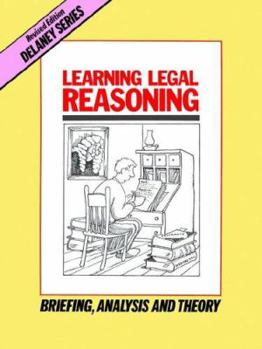Learning Legal Reasoning: Briefing, Analysis and Theory (Delaney Series Book 1)
Select Format
Select Condition 
Book Overview
This widely used book in many printings begins with answers to forty commonly asked questions of first-year law students. It specifies a six-step approach to briefing a case with specific guidelines... This description may be from another edition of this product.
Format:Paperback
Language:English
ISBN:0960851445
ISBN13:9780960851447
Release Date:May 2011
Publisher:John Delaney Pubns
Length:139 Pages
Weight:0.87 lbs.
Dimensions:11.0" x 0.8" x 8.5"
Customer Reviews
5 ratings
Perfect introduction
Published by Thriftbooks.com User , 17 years ago
I just finished reading (working through I should say) Learning Legal Reasoning, and I'm amazed at how much I got out of it. You actually get practice applying skills that are explained in a very thoughtful way. I certainly can't produce briefs as good as the examples in the book, but it seems like I am about 70% there, which gives me confidence since I have quite a while before starting school. It's a fantastic introduction.
Start your preparation for law school here.
Published by Thriftbooks.com User , 17 years ago
The immediate challenge in my law school experience was having to learn a a new way of reasoning and a method to make it work in the case format. I thought I was prepared for the volume of work but without a running start with these, even at a rudimentary level of competence, the work load became overwhelming. I recommend highly you avoid this situation, and it's easy to do. Buy Mr. Delaney's book and spend enough time prior to beginning law school making its contents the blueprint for your approach to learning. This the best advice I can give anyone entering law school or considering a law school education.
Read this book before 1L!!!
Published by Thriftbooks.com User , 17 years ago
I read LLR before starting my first year of law school. It is a GREAT introduction to the law. Professor Delaney wrote this with the beginning law student in mind. It covers everything a neophyte needs to know (common law tradition, court opinions, law school briefing, etc.) in a workbook format. Professor Delaney also places great attention on the role of judges in shaping the law. This book is straightforward and easy to understand, yet provides the reader with all the tools necessary to attack your 1L classes. Worth every penny (and then some).
Indispensable for Beginning Law Students
Published by Thriftbooks.com User , 18 years ago
This is a must-read for anyone going to law school. It orients the beginning law student to the interweaving case law, statutory law, and policy that guide judicial opinions and teaches students how to extract the key elements from those opinions by way of the case briefing method. At 130 pages, it is page for page, and pound for pound, one of the best law prep books you can find. That said, don't think this book is a "quick read." Quite the contrary. To get the most out of this book, you must do some writing - "brief" all six cases presented and compare your work to the samples provided. Then highlight and note what you did right, and what you did wrong. Put the time and work in, and by your 6th brief, you will be amazed at how much progress you have made towards case briefing proficiency (one of the fundamental skills required of first year law students). Whether or not you read anything else before starting law school, you will want to read this book. If you are really serious about preparing for law school (which you should be if you plan on getting good grades), you'll also need the other books in the Delaney series: "How to Do Your Best on Law School Exams," and "Learning Criminal Law as Advocacy Argument."
If you're serious about doing well, you need this book
Published by Thriftbooks.com User , 24 years ago
I am the author of Planet Law School: What You Need to Know Before You Go -- but Didn't Know to Ask. So, it might seem that John Delaney and I are competitors (and our books do have different publishers). But as I said in PLS, this book by Delaney is something every serious law student should get.He presents beautiful examples of "case-parsing," which is what good legal analysis involves. In fact, he's brilliant, but without being flashy about it. To read his book is to rise above all the drudgery and the minutiae of the first-year of law school, and to see the beauty of what's involved in "Thinking Like a Lawyer." It is inspiring.Yet, the book isn't some "ivory tower" fantasy on the Wonders of the Law. It's very down-to-earth, nitty-gritty, in the way you actually have to go about applying the law to the facts.Too many prospective law school students are only interested in a "quickie" book that they kid themselves will help them adequately prepare for what lies ahead. They'll be sorry. Learning Legal Reasoning is NOT "Law School Lite." But it is a delight.





